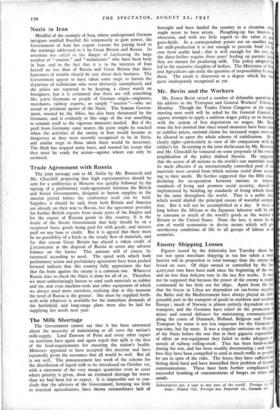Enemy Shipping Losses
Figures issued by the Admiralty last Tuesday show that our war upon merchant shipping at sea has taken a mica heavier toll in proportion to total tonnage than the enemy ha: levied on ours. Of ships owned or controlled by the Axis 4,007,000 tons have been sunk since the beginning of the wr, and no less than 6o6,000 tons in the last five weeks. It mu, not be supposed that because the power of the enemy Is mainly continental he has little use for ships. Apart from the fad that the forces in Libya are dependent on sea-borne supplies, the Baltic and the Mediterranean have always played an indis- pensable part in the transport of goods in northern and southern Europe ; much of Norway is almost entirely dependent on sea transport, and the Germans have relied on the protection nt mines and coastal defences for maintaining communications along the coasts of Denmark, Holland, Belgium and France. Transport by water is not less important for the Germans in war-time, but far more. It was a singular omission on the pat of the Nazis before the war that in their gigantic expenditure of effort on war-equipment they failed to make adequate re- newals of railway rolling-stock. That has been hard-worked during the war, and has been steadily deteriorating ; and there- fore they have been compelled to send as much traffic as possible by sea in spite of the risks. The losses they have suffered are hitting them hard, and have intensified their problem of internal communications. These have been further complicated bf successful bombing of concentrations of barges on rivers and canals.


























 Previous page
Previous page